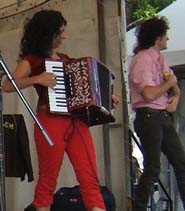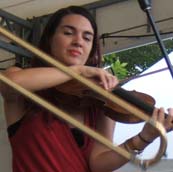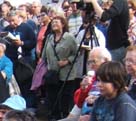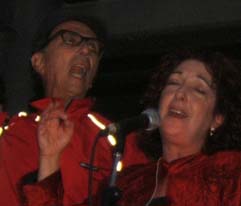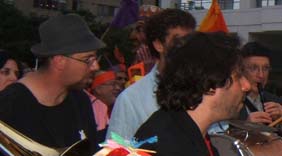Wrapping up Ashkenaz, one week later
 This was a good Ashkenaz. It doesn't have that edge that the early festivals had, but Mitch Smolkin managed to pull together an incredibly diverse festival, one that contained a lot to please the crowds, but which also provided a neat snapshot of Jewish music, primarily of that side of Jewish music that derives primarily from Eastern Europe. It was the sort of festival where we went from Marilyn Lerner and Adrienne Cooper presenting Anna Margolin's poetry in a new, avantgarde artsong setting, to two sessions featuring MacArthur grantee Ben Katchor, to Israeli Sephardic phenomenon Yasmin Levy. And that doesn't begin to encompass the diversity of what we saw. At the finale, Mitch introduced his stepping down, and his replacement, charged with outdoing all of this in 2008, KlezKanada staffer and Beyond the Pale bandleader Eric Stein. It would be hard to imagine a better choice.
This was a good Ashkenaz. It doesn't have that edge that the early festivals had, but Mitch Smolkin managed to pull together an incredibly diverse festival, one that contained a lot to please the crowds, but which also provided a neat snapshot of Jewish music, primarily of that side of Jewish music that derives primarily from Eastern Europe. It was the sort of festival where we went from Marilyn Lerner and Adrienne Cooper presenting Anna Margolin's poetry in a new, avantgarde artsong setting, to two sessions featuring MacArthur grantee Ben Katchor, to Israeli Sephardic phenomenon Yasmin Levy. And that doesn't begin to encompass the diversity of what we saw. At the finale, Mitch introduced his stepping down, and his replacement, charged with outdoing all of this in 2008, KlezKanada staffer and Beyond the Pale bandleader Eric Stein. It would be hard to imagine a better choice.
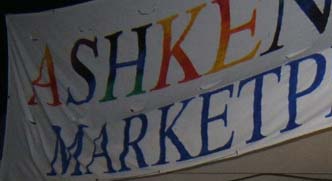 In terms of trends, I have to note that in addition to the Lerner-Cooper artsong, one of the festival's few "edge" moments, Teresa Tova had a release party for a CD of living Yiddish poet/songwriter Beyle Schaechter-Gottesman's songs; Lenka Lichtenberg and Brian Katz had a release party for a new CD of settings of the poetry of Simcha Simchovitch; while poet Adeena Karasick presented her own work in a multimedia show; and Adrienne Cooper (who led the singers in the Ashkenaz parade and brought a show about painter Marc Chagall to the festival) hosted new settings of Yiddish poetry in settings created by young artists in Eastern Europe. This feels like the largest collection of new Yiddish music in one place at one time, maybe in my lifetime.
In terms of trends, I have to note that in addition to the Lerner-Cooper artsong, one of the festival's few "edge" moments, Teresa Tova had a release party for a CD of living Yiddish poet/songwriter Beyle Schaechter-Gottesman's songs; Lenka Lichtenberg and Brian Katz had a release party for a new CD of settings of the poetry of Simcha Simchovitch; while poet Adeena Karasick presented her own work in a multimedia show; and Adrienne Cooper (who led the singers in the Ashkenaz parade and brought a show about painter Marc Chagall to the festival) hosted new settings of Yiddish poetry in settings created by young artists in Eastern Europe. This feels like the largest collection of new Yiddish music in one place at one time, maybe in my lifetime.
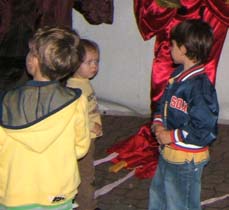
Sunday
I've already written about seeing Veretski Pass on Saturday night, one of the festival high points for me. Sunday morning I repaired to Chinatown, near the old Kensington Market and next door to one of the synagogues that served that market. This is where the old Ashkenaz Parade used to start from back in the original festival. We, however, had a perfectly congenial brunch of Vietnames pho and caught up with each other. It had been two years—the last Ashkenaz—since I had last been here. We made it to the festival in time to catch a new-to-me Toronto band called KlezFactor. The band played an interesting set of klezmer-tinged jazzrock with a pleasing hard dance edge. Judy caught the Tonoto Jewish Folk Choir and thoroughly enjoyed their program.
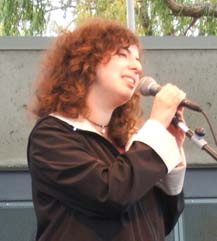 We regrouped in front of the main stage to see one of the many new Eastern European klezmer bands. In this case, it was Kharkov Klezmer, featuring the golden-tongued Yevgeniya "Genya" Lapatnyk. We had seen all of the bands the night before at Michael Alpert's "Cabaret Russe," and thoroughly enjoyed hearing this band on its own. While I was at it, I stopped by the festival kiosk and picked up an exciting recording by a second eastern european band, Dobra Notch, which plays a mad Ukrainian/klezmer tsimbl+percussion heavy accoustic dance music that could be seen as the Eastern European version of a hot New England Contradance band. North America isn't the only locus of a revived Yiddish folk sound—as Kharkov Klezmer proved, yet again, with Genya singing some of her originals, as well as less-familiar folk standards and the band's full-tilt-boogie klezmer.
We regrouped in front of the main stage to see one of the many new Eastern European klezmer bands. In this case, it was Kharkov Klezmer, featuring the golden-tongued Yevgeniya "Genya" Lapatnyk. We had seen all of the bands the night before at Michael Alpert's "Cabaret Russe," and thoroughly enjoyed hearing this band on its own. While I was at it, I stopped by the festival kiosk and picked up an exciting recording by a second eastern european band, Dobra Notch, which plays a mad Ukrainian/klezmer tsimbl+percussion heavy accoustic dance music that could be seen as the Eastern European version of a hot New England Contradance band. North America isn't the only locus of a revived Yiddish folk sound—as Kharkov Klezmer proved, yet again, with Genya singing some of her originals, as well as less-familiar folk standards and the band's full-tilt-boogie klezmer.
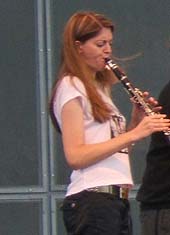 Because of the rain, the day's popular concerts that had been scheduled for the second outdoor stage were held in a smaller area. Invariably, we failed to get in to shows that we wanted to hear: a Jasmine Levy workshop, and two interesting fusion bands: "Matzo Ball Gumbo" featuring klezmer with New Orleans inflections, and "Shakshuka," Middle Eastern amplified dance music that reminded me a lot of "Macedonian Mazl Tov" of the '97 Ashkenaz Festival.
Because of the rain, the day's popular concerts that had been scheduled for the second outdoor stage were held in a smaller area. Invariably, we failed to get in to shows that we wanted to hear: a Jasmine Levy workshop, and two interesting fusion bands: "Matzo Ball Gumbo" featuring klezmer with New Orleans inflections, and "Shakshuka," Middle Eastern amplified dance music that reminded me a lot of "Macedonian Mazl Tov" of the '97 Ashkenaz Festival.
Instead, I got a seat to hear old favorites, Chicago Klezmer Ensemble. Now, those people who know the band, know that they play a rather delicate, chamber-music style of klezmer, generally known for its sublety and grace. Bandleader Kurt Bjorling, however, has never been one to stand still. Hearing that an air show was happening nearby, he enlisted several of the pilots as extras in the band. Sadly, they almost universally blew their cues. Bjorling's assessment was that next time the band would hire parachutists and work on more rehearsals ahead of time. We'll see. But, even accepting that the air traffic was often entering at the wrong moment, the music was simply wonderful in this rare indulgence at the festival, for me, to hear old time, familiar friends rather than going for the new stuff.
Because we had missed two earlier concerts due to full music rooms, Judy and I scooted right over to the Lakeside Terrace as soon as CKE finished its set. To our pleasure, we were among the first in line, and were rewarded by awesome music. Think of Marilyn Lerner's diversity of styles on the jazz piano--a sort of classical avantgardism, infused with deep knowledge of Jewish music. There was an amazing bass player, and a woodwind person who definitely got the emoting part of the music. Then add in Adrienne Cooper's voice and precede with a short lecture on Anna Margolin. Bliss. Pure bliss. And amazing poetry, newly translated by Cooper:
Night Entered My House
Night entered my house
With the roar of stars, waters, wings
With the glow of swamps, back roads, mists
I lay in darkness.
Trees came into my house
Looming huge with roots and trunks
And the deep gaze of leaves.
And enormous clouds
Came with thunder and laughter
Like the dark heads of the gods.
And all whirled heavy and wild and bleak
And all rumbled, "You are, you are, you are."
I lay in darkness.
I was totally moved by the time voice and music got to the phrase "you are, you are, you are" in one of the most memorable among memorable new artsongs. This is a special program. Lerner and Cooper appear together infrequently. Jump at the chance to hear them when it arises.
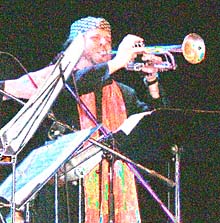 I had good intentions about seeing Merlin and Polina Shepherd and their respective ensembles, but after talking with friends from Argentina about the Lerner-Cooper pieces, I felt obliged to stay and listen to what was billed as "Ashkenaz Special Guests," and was, of course, Klezmer en Buenos Aires in another smoking set. Judy did catch the other concert, and then stayed to hear the SoCalled Orchestra and was likewise very happy. Our whole group wrapped the evening up by hearing Marilyn Lerner in a CD release concert featuring music from her new "Romanian Fantasy" CD (klezmer-inflected jazz, solo piano). Her musicianship and the range of sounds, and the humor as she even did a couple of numbers with prepared piano (a piano in which strategic devices have been placed on the strings for sound effect or, in addition in this case, to pop up as did her ping pong balls). It was like gilding the lily to finish the evening with Aaron Alexander's Midrash Mish Mosh, but who am I to object to gilding the lily in this sort of case. Any band anchored by Alexander is going to be great. This one featured Merlin Shepherd, Alex Kontorovich, Frank London, Greg Wall, Dan Blacksberg, Dave Richards, and included guest stints with Dobra Notch, Christian Alexander, Lerner, and Ashkenaz newcomer Guy Schalom. It was killer.
I had good intentions about seeing Merlin and Polina Shepherd and their respective ensembles, but after talking with friends from Argentina about the Lerner-Cooper pieces, I felt obliged to stay and listen to what was billed as "Ashkenaz Special Guests," and was, of course, Klezmer en Buenos Aires in another smoking set. Judy did catch the other concert, and then stayed to hear the SoCalled Orchestra and was likewise very happy. Our whole group wrapped the evening up by hearing Marilyn Lerner in a CD release concert featuring music from her new "Romanian Fantasy" CD (klezmer-inflected jazz, solo piano). Her musicianship and the range of sounds, and the humor as she even did a couple of numbers with prepared piano (a piano in which strategic devices have been placed on the strings for sound effect or, in addition in this case, to pop up as did her ping pong balls). It was like gilding the lily to finish the evening with Aaron Alexander's Midrash Mish Mosh, but who am I to object to gilding the lily in this sort of case. Any band anchored by Alexander is going to be great. This one featured Merlin Shepherd, Alex Kontorovich, Frank London, Greg Wall, Dan Blacksberg, Dave Richards, and included guest stints with Dobra Notch, Christian Alexander, Lerner, and Ashkenaz newcomer Guy Schalom. It was killer.
Monday
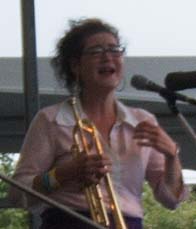 Usually we catch a set or two on Mondays at Ashkenaz, and then head back to Boston. But we knew we didn't want to face the hour or two wait at the border in late afternoon, so we agreed to take the whole day off and to return in the morning. The day started with the incomparable Aaron Bensoussan in a great outdoor concert. Following that, I made one of my few bad choices and slept through a panel on Jews and Graphic Novels. I would have loved to hear more about their work from any of the participants: Ben Katchor, Stan Mack, Bernice Eistenstein. But here they were limited to talking about "graphic novels" and I got the sense that little worth hearing was said. My fault. All gave other sessions during the festival, this was the only one I caught.
Usually we catch a set or two on Mondays at Ashkenaz, and then head back to Boston. But we knew we didn't want to face the hour or two wait at the border in late afternoon, so we agreed to take the whole day off and to return in the morning. The day started with the incomparable Aaron Bensoussan in a great outdoor concert. Following that, I made one of my few bad choices and slept through a panel on Jews and Graphic Novels. I would have loved to hear more about their work from any of the participants: Ben Katchor, Stan Mack, Bernice Eistenstein. But here they were limited to talking about "graphic novels" and I got the sense that little worth hearing was said. My fault. All gave other sessions during the festival, this was the only one I caught.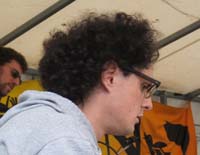
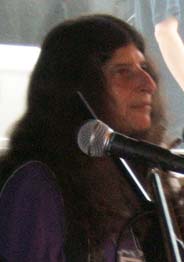 On the other hand, I followed the talkfest going back and forth between the lecture hall and outdoors, catching wonderful music from Susan Watts, then Judith Cohen with daughter Tamar, and a quite wonderful dumbek player, Geoff (last name lost), and back to the outdoors to hear Golem hold young and old rapt with their latest Yiddish punk and cabaret stylings.
On the other hand, I followed the talkfest going back and forth between the lecture hall and outdoors, catching wonderful music from Susan Watts, then Judith Cohen with daughter Tamar, and a quite wonderful dumbek player, Geoff (last name lost), and back to the outdoors to hear Golem hold young and old rapt with their latest Yiddish punk and cabaret stylings.
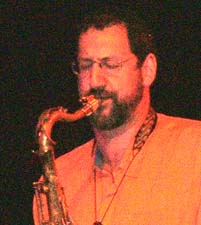 While Judy went from Lenka Lichtenberg to Theresa Tova, I headed off to finally hear Greg Wall live. Wall has an album out on Tzadik, Later Prophets, which I really love. It's Jewish jazz, of course, but different. Hearing Wall talk about the songs, and coming to write them as he prepared his son for Bar Mitzvah, I got a bit deeper than I expected. The keyboard player was a wizard—cascading rivers of notes like McCoy Tyner. I loved watching the bass player's lips move as he spoke what he was playing. And Wall's sax and other reeds was such a pleasure. The trio closed with "Papirosn," a song that I mentally place in the "though shall not perform this old chestnut without special dispensation or proof that you have something to say." Wall has a lot to say. I hear "Papirosn" with entirely different ears now. Thank you.
While Judy went from Lenka Lichtenberg to Theresa Tova, I headed off to finally hear Greg Wall live. Wall has an album out on Tzadik, Later Prophets, which I really love. It's Jewish jazz, of course, but different. Hearing Wall talk about the songs, and coming to write them as he prepared his son for Bar Mitzvah, I got a bit deeper than I expected. The keyboard player was a wizard—cascading rivers of notes like McCoy Tyner. I loved watching the bass player's lips move as he spoke what he was playing. And Wall's sax and other reeds was such a pleasure. The trio closed with "Papirosn," a song that I mentally place in the "though shall not perform this old chestnut without special dispensation or proof that you have something to say." Wall has a lot to say. I hear "Papirosn" with entirely different ears now. Thank you.
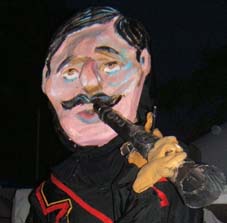 The Ashkenaz parade and pageant was led by Festival co-founder David Buchbinder. Although limited to the Harborfront area (although we did walk out on the street for a few feet), it was as much fun as usual. Kids and others had worked on new masks. The huge puppets were present, marching among us. Buchbinder seemed to forget to keep moving the parade—we'd go a few feet, then stop for more music, and eventually the parade marshall would get things moving again. As we completed the loop around the center, we were greeted by an entire chorus of singers, adding their voices to the music, and flag dancers, in white, on tall stilts came out with flags: "Imagine", "the word", "peace", waving the flags to the music, dancing on stilts. I ran into my friend Michael among the parade marchers. Now 13, Michael, his parents, and I have been meeting like this for most of his life. It was a thrill to see him continue his klezmer and yiddish education post-bar mitzvah.
The Ashkenaz parade and pageant was led by Festival co-founder David Buchbinder. Although limited to the Harborfront area (although we did walk out on the street for a few feet), it was as much fun as usual. Kids and others had worked on new masks. The huge puppets were present, marching among us. Buchbinder seemed to forget to keep moving the parade—we'd go a few feet, then stop for more music, and eventually the parade marshall would get things moving again. As we completed the loop around the center, we were greeted by an entire chorus of singers, adding their voices to the music, and flag dancers, in white, on tall stilts came out with flags: "Imagine", "the word", "peace", waving the flags to the music, dancing on stilts. I ran into my friend Michael among the parade marchers. Now 13, Michael, his parents, and I have been meeting like this for most of his life. It was a thrill to see him continue his klezmer and yiddish education post-bar mitzvah.
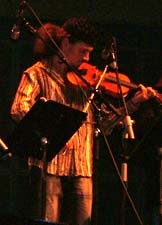 The festival closed with an amazing set by Israeli pop-Sephardic singer Yasmine Levy. I love her voice, but I will probably never be as much a fan of her singing as, say, that of Ofra Haza whose memory was triggered in my mind at several points during the performance. Still, that's not to say that she is anything but an entirely pleasurable singer.
The festival closed with an amazing set by Israeli pop-Sephardic singer Yasmine Levy. I love her voice, but I will probably never be as much a fan of her singing as, say, that of Ofra Haza whose memory was triggered in my mind at several points during the performance. Still, that's not to say that she is anything but an entirely pleasurable singer. 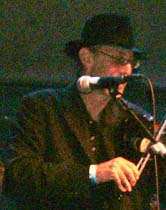 Following Levy (whose originally-scheduled performance had been rained out Saturday night), a kick-ass crowd of musicians came on stage to play a tribute to the recently-passed klezmer, German Goldenshteyn. German showed up in this country a little over a decade ago, with a notebook filled with several hundred compositions, and a lifetime playing simchas in a region that supposedly had no Jews post-Holocaust, and no klezmorim under the Soviets. He was also a major mensh and a great teacher. Listening to his now-familiar tunes, I was lost in reverie—the few times I had met German, listening to Michael Alpert talk about wanting to spend more time with him rather than tour with his main band, listening to German talk at KlezKanada years ago (Alpert translating from Goldenshteyn's Yiddish) about his music, his repertoire, and what he played in Bessarabia. It was a good ending to a great festival. But it's been a week. I'm ready for Ashkenaz 2008 already. Or, maybe someone here in Boston will help us put together something even partially as much fun, here.
Following Levy (whose originally-scheduled performance had been rained out Saturday night), a kick-ass crowd of musicians came on stage to play a tribute to the recently-passed klezmer, German Goldenshteyn. German showed up in this country a little over a decade ago, with a notebook filled with several hundred compositions, and a lifetime playing simchas in a region that supposedly had no Jews post-Holocaust, and no klezmorim under the Soviets. He was also a major mensh and a great teacher. Listening to his now-familiar tunes, I was lost in reverie—the few times I had met German, listening to Michael Alpert talk about wanting to spend more time with him rather than tour with his main band, listening to German talk at KlezKanada years ago (Alpert translating from Goldenshteyn's Yiddish) about his music, his repertoire, and what he played in Bessarabia. It was a good ending to a great festival. But it's been a week. I'm ready for Ashkenaz 2008 already. Or, maybe someone here in Boston will help us put together something even partially as much fun, here.
